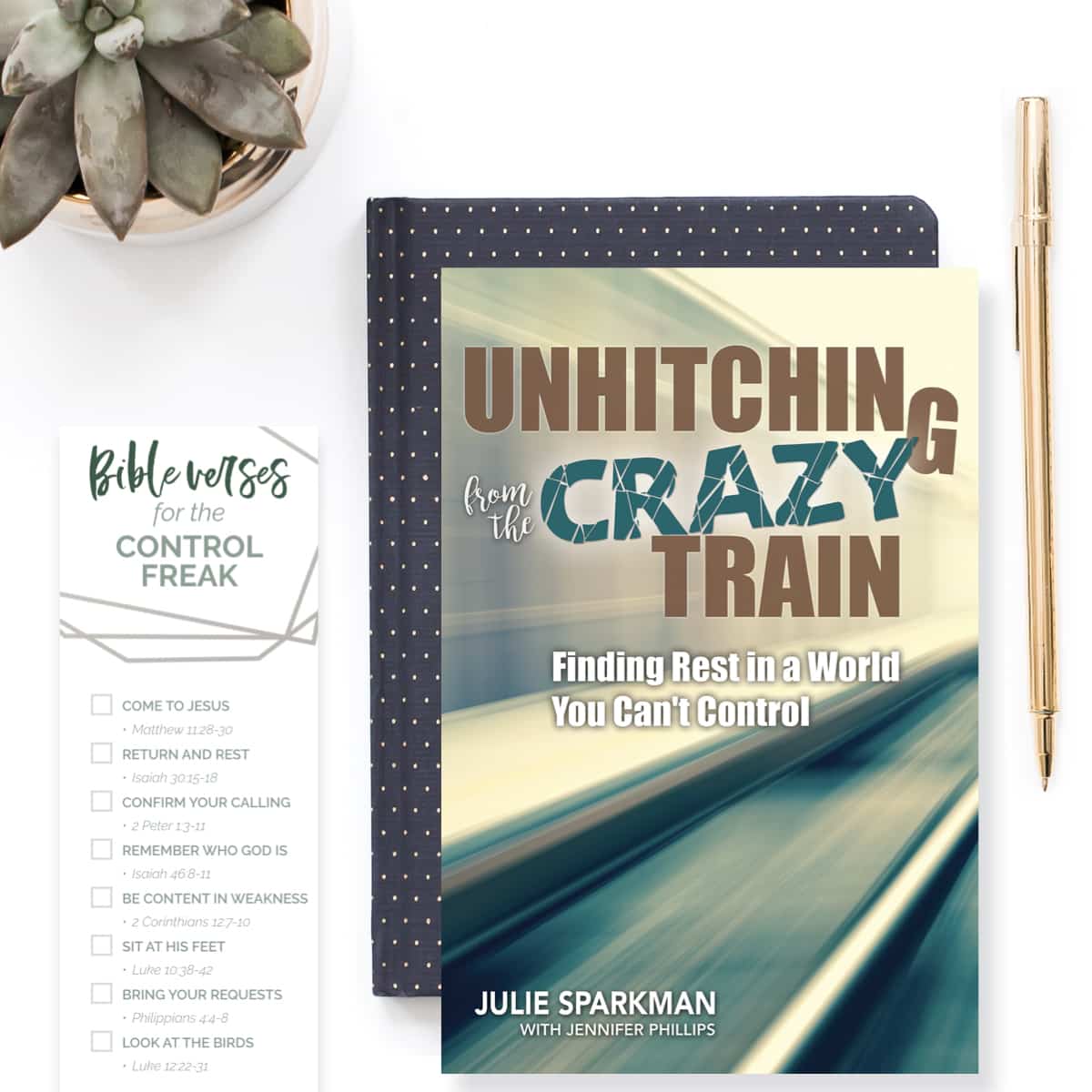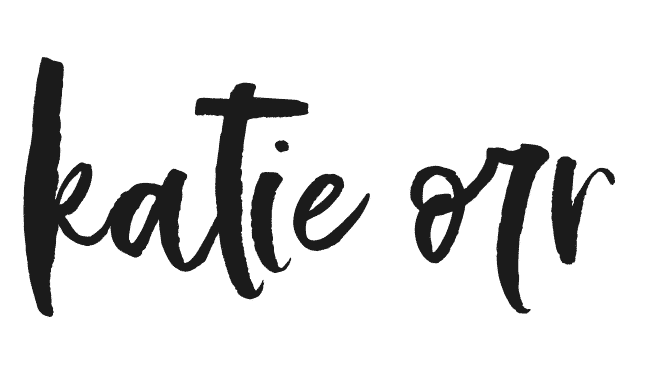The following is an excerpt from the book Unhitching from the Crazy Train: Finding Rest in a World You Can’t Control by Julie Sparkman and Jennifer Phillips.
I will readily tell you that I know beyond a shadow of a doubt that I do not have control over my children’s lives. And yet, when my desired picture for my children is threatened, I can demonstrate some crazy behavior that would suggest otherwise. When my son missed basketball tryouts because I lost the sign up sheet, or when my daughter had to have her earring surgically removed because I failed to make sure she was following post-piercing protocol, my confusion over role and responsibility sent me to the depths of despair. I believed my son would never find his place in his new school because he wouldn’t be on the team, and I assumed that my daughter would have an irrational fear of earrings for the rest of her life. And guess what? It would be all my fault . . . or so I thought.
If those predictions had come true (they didn’t), it would be absolutely correct to say I had a role in those outcomes. However, they could not have come true without the influence of certain circumstances and actions that were beyond my control. I would have had a role in those outcomes, but they would not have been my responsibility. I would have needed to confess my negligence and ask God to strengthen the areas in which my parenting and organizational skills were weak, but my actions could not have rewritten God’s story for their lives. I’m not that important. None of us is.
This was a lesson I had to learn on a much larger scale during a particularly dark time in my life, a season in which my faith could have been destroyed if I had not come to grips with the difference between role and responsibility. It was the fall of 2012, and I was enjoying a life that was pretty close to my picture. My counseling partner and I had just opened a counseling ministry. I was in the middle of teaching a Bible study that was being filmed for nationwide distribution. My son had graduated from college and was pursuing his career in California. My husband loved his job. My daughters were doing fine in school. Everything was on track. Then one day, out of the blue, reality took a sharp detour farther away from my picture than I had ever experienced.

It began with a phone call from my son. He had noticed a lump growing under his arm and decided to get it checked out. He called to say that his doctor was sending him for an immediate ultrasound. My world started to tilt. My picture started to shake. Two days and many tests later, my picture was shattered completely with his diagnosis of B-cell non-Hodgkin lymphoma.
Our family was thrust into a world of huge decisions and a new cancer language we neither spoke nor understood. A well-meaning friend who was a cancer survivor said, “You have to get him treated at Cedars-Sinai Medical Center. They have the cutting-edge technology that he needs.” This would have been good advice if his insurance had been accepted at Cedars-Sinai, but it wasn’t; only the smaller hospital nearby would cover his treatment. Fueled by my belief that my son’s treatment would determine his outcome, the voices in my head were deafening: “A good mother would do whatever she had to do to secure the absolute best care for her child. Mortgage her house. Sell her hair. Sell her blood. Whatever it takes.”
Somehow, in the fog of cancer war, saving my son’s life became my responsibility.
We consulted with two oncologists who both confirmed that my son’s treatment was very standard, and that he would get the same treatment no matter what hospital he went to. We arranged for him to be treated at the smaller hospital that took his insurance. The night before my son was scheduled to begin chemo, he got a phone call from his doctor.
“Listen, I didn’t feel completely comfortable with your pathology report, so I sent your scans to a lymphoma specialist. You don’t actually have lymphoma B. This doctor confirmed that you actually have Burkitt lymphoma, a cancer so rare and dangerous that we can’t treat you here. We need to completely change your treatment plan and send you to Cedars-Sinai.”
Had this error not been caught, my son’s cancer would have responded to the original treatment very quickly because that is what Burkitt does. However, it probably would have returned with a vengeance in his brain and spine. My son’s prognosis would not have been good.
Would that have been my responsibility? After all, I didn’t listen to my friend, the cancer survivor. I didn’t research enough to know about the lymphoma expert to whom his doctor sent the report. When my son’s original diagnosis and treatment plan were presented to us, I did not demand that the doctor run the lab work again. I didn’t read any books by cancer survivors. Some might say I had failed. And yet, God spared him. Did I have a role in my son’s health? Yes. I had a role in securing the best care for him. But it was God’s responsibility to give him what he needed, and His best for my son at that time was to direct him to the treatment that would save his life.
I know what you’re thinking. This story is conveniently easy to tell because your son is still alive.
You’re right. And I’m grateful. But had I lost my son that year, I would tell you today that my son’s death was not my responsibility because that is a burden God never intended for anyone to bear. To carry a load that is only meant for the Father would most certainly crush me. Instead, I would pray for faith to cling to the truth that the Father always gives us what we need, whether in life or in death.
I realize how hard this is to hear. It’s hard for me to say. I have shared this story in front of a woman whose husband had the same treatment as my son, but her husband died. I do not pretend to understand why. I don’t know why. It’s not okay, and pat assurances that “it will all work out in the end because we know who is on the throne” fall flat for people who are in great pain. Sometimes I scream at the Father because suffering is horrible and I don’t know why some are spared and some are not. God does not ask us to be happy with life outside our pictures; that’s not what faith is about. Faith strains to see His face. Faith screams and claws and fights its way to the surface, demanding, “You say You’re good. Show me! Open my eyes so I can see You in this dark place.”
I remember sitting in my hotel room while my son was in treatment, reeling from his grave appearance. In the weakest voice I whispered, “Where are you? Show me Your presence, God. What are You doing here? Show me.”
In that frail moment, I put on new glasses with the two crucial lenses that are the foundation of Christ’s easy and light yoke: He is in this, and He is in me.
First, He is in this. My son’s sickness. The loss of his job. Sin and sickness do not thwart the plan of God. He is here, and His purposes will prevail. And secondly, He is in me. “His divine power has given us everything we need for a godly life (2 Peter 1:3). This means that God has fully equipped me for whatever comes into my life, even my son’s cancer.
I wanted to scream, “You’ve given me everything I need? Are you sure, God? Because I’m pretty sure I was standing in the Diet Coke line the day You handed out the maturity gene. I’m mouthy and high maintenance and I do not do crisis well.”
Yet, in a silent California hotel room, broken by my son’s brokenness, I had all I needed.
Can you put those glasses on? I know you don’t want to. I know it’s scary. It may take a sheer act of will in the midst of your pain and confusion, but set those glasses on top of your nose, and hold them in place because they tend to fall off easily. When your picture starts to shake; when you look at the mess you have made of things; when the brokenness of the world touches your life with searing pain, fight to keep those lenses in place. He is in this, and He is in me. If I had not been able to wear those glasses as I stared my son’s potential death in the face, I don’t think I would have survived it.
I am sorry to say the glasses don’t fix everything. Wearing the glasses won’t change your circumstances, and they won’t ensure that you will now be happy about whatever adversity you’re facing. But they allow you to view life from God’s perspective. We serve a powerful and sovereign God who only acts for our good and His glory, and when we believe He is in this—whatever “this” is—it causes us to look hard for Him when we probably would not have otherwise. We see glimpses of His kindness and commitment to our holiness; we see ways He is changing us for the better. Wearing the glasses makes us free-er. Free-ish. And if you have ever been in great pain, you know that being free-ish, even for a few minutes at a time, is a lifeline. Manna for the moment. In that small moment, choosing to trust in the character of the God who never changes is enough to get you to the next moment.
He is in this; He is in me.
When you blow it with your kids again, when you think you’re making the right decision and it backfires, when you’re tempted to believe there is no way God can redeem the mess you’ve made out of life: He is in this; He is in me, whether or not A plus B equals C. No circumstance or person can ever change that, praise God.

This is an excerpt from the book Unhitching from the Crazy Train: Finding Rest in a World You Can’t Control by Julie Sparkman and Jennifer Phillips. They’ve also created an accompanying reading plan—Bible Verses for the Control Freak—you can find in the Enjoy God’s Word Resource Library.


